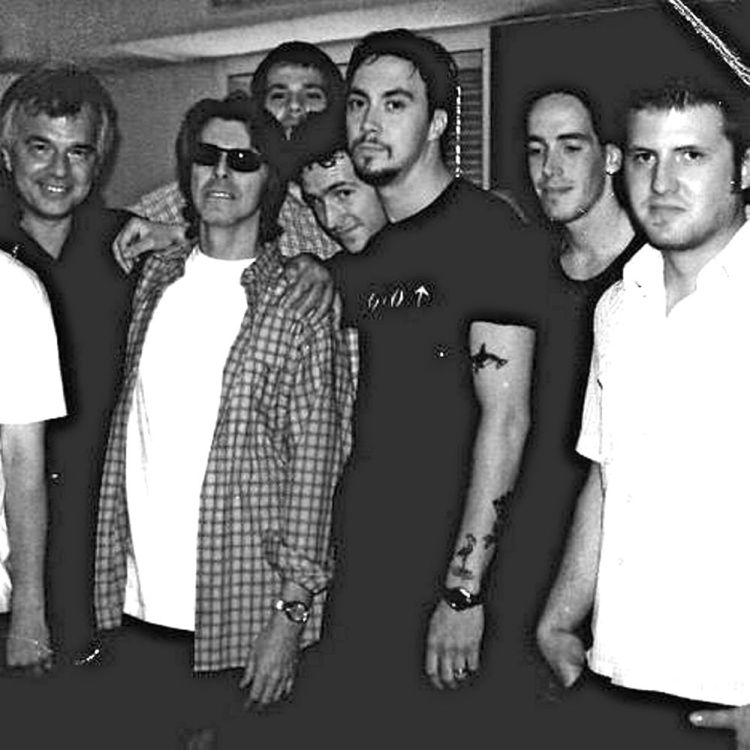It had to be a joke, Dave Gutter thought.
What would David Bowie, a rock legend, want with Rustic Overtones, a bunch of unknown 20-something musicians from Maine?
It was the summer of 1999 and Rustic Overtones was in New York making an album for Arista. The record label had given the group a list of producers it could choose to work with and the band picked Tony Visconti, well-known for collaborating with Bowie.
But Visconti hadn’t worked with Bowie in years, so when Visconti told the Maine musicians he had called Bowie and asked him to come to the studio to record some vocals, they didn’t believe it.
Then one day, while they were munching on sandwiches and “messing around” on their instruments, the young Mainers looked up to see a smallish man in a plaid flannel shirt and work boots. It was Bowie.
“There was less than a second of that ‘Oh my God, it’s a rock god’ intimidation,” Gutter, 41, said Monday. “As soon as we started talking about music he made us feel like we were all on the same level. He was completely respectful of us as musicians, and pushed us to do more challenging stuff.”
Bowie, a music and pop culture icon, died Sunday at the age of 69 after a battle with cancer. Gutter, who still fronts Rustic Overtones and works as a songwriter, said Monday that Bowie has remained an inspiration for him and his band mates all these years later. Not just for his music, but for his humility and his great passion for the creative power of music.
“SECTOR Z”
Bowie ended up recording vocals for two songs on Rustic Overtones’ “Viva Nueva” album, “Sector Z” and “Man Without a Mouth.” In addition to the day or so he spent working in the studio with them, Bowie visited the young musicians often during the three months when they were recording in the New York City area. He took them to his media interviews, out to lunch, and on outings to museums.
“The time he spent with us had a big impact, as far as a young band forming our perspectives on music, our ideals and our priorities,” Gutter said. “We’ve stayed true to the music, I think, because that’s what Bowie told us to do.”
Visconti had first made a connection in his mind between Rustic Overtones and Bowie after hearing Rustic’s “Hardest Way Possible,” which has an opening that reminded him a lot of Bowie’s “Young Americans,” Gutter said. So he called Bowie about the Maine band, and sent him songs to listen to.
Gutter said Bowie was smaller in person than he had imagined him, after years of seeing him in glam costumes with poofed up hair. He also traveled alone, no bodyguards, no entourage.
“MAN WITHOUT A MOUTH”
Gutter thought someone of Bowie’s stature might just come in, do one take and leave with his paycheck. But Bowie collaborated with and even acquiesced to the wishes of his younger, less experienced counterparts. And when he had done his work, he didn’t accept any money, Gutter said.
“He would do a take and then say, ‘What do you guys think? Should I do something different?’ ” Gutter said.
Even though Bowie wasn’t intimidating, he was still Bowie, a rock star. Although Gutter felt at ease joking and laughing with Bowie, he also was collecting his cigarette butts and mailing them to his mother for safekeeping as mementos.
At one point, Gutter and Bowie sat in a recording booth together for an hour or more, writing lyrics for “Sector Z,” a song about space aliens tuning into a rock ‘n’ roll radio signal. Bowie, as music fans know, had some experience with songs about space.
Arista eventually parted ways with Rustic Overtones and didn’t release “Viva Nueva.” The album was released by the smaller Tommy Boy label in 2001, but did not bring the band the national success so many of its Maine fans had anticipated.
Rustic Overtones’ members had bristled under the pressure of trying to record hits for their first big record, but Gutter says Bowie impressed upon them the need to not settle for anything less than creative satisfaction. Of the songs they were working on, Bowie liked the ones that the band members figured the label would shy away from.
“The ones he was drawn to were the ones that would be a record label’s nightmare,” Gutter said. “We felt this need to try to make some life-changing music, not that we did, but Bowie was into that side of it.”
Gutter never saw or spoke to Bowie again, but he often thinks about how Bowie helped some Maine kids find their voices, and what was important to them.
After working with Rustic Overtones, Bowie wrote about them on his website. Gutter said he couldn’t believe the kindness Bowie had exhibited. That thought again was on his mind Monday.
“This rock god was so nice to me,” Gutter said.
Send questions/comments to the editors.




Comments are no longer available on this story